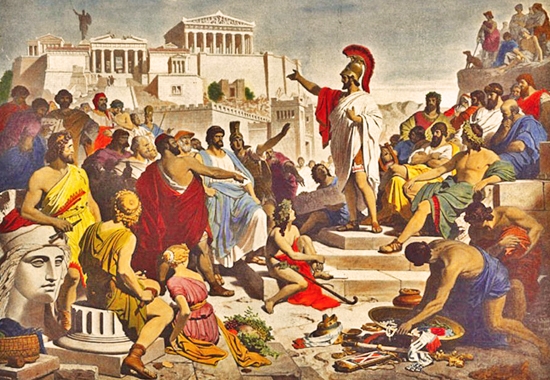Sunshine rained down on the rocky terrain of Athens. The wind’s cool breeze blew through the leaves of the olive trees and the world seemed blissful, as if humanity’s forever remaining conflicts did not exist. This moment of serenity only served as the backdrop to a story that seemed to be just the opposite. This drama became the stuff of history, rich in its effects on both its contemporaries and posterity. It is the tale of Pericles and the world that he impacted.
A society’s success and culture is synonymous with the individuals that inhabit it. In the fifth century BCE, the Greek city-state of Athens was governed by way of democracy. This democratic rule, however, was more directly self-ruled and founded on the idea that only qualified citizens (generally land-owning free adult males of Athenian birth) could participate.1 This form of leadership was far from perfect and lacked proper guidance. The political scene was dominated by those who had the most influence through wealth and power, and they often got their way. Also, the population was too easily swayed by the callings of a persuasive speaker, which is why Athens was in need of an honest, morally driven man to guide it.2 Society, as we know, struggles with possessing the knowledge and rationale that is required to run a government efficiently, so it’s important to have a suitable leader for the job.
Pericles was well-versed in the subjects of morality, ethics, and politics. His father, Xanthippus, and his mother, Agariste, were sure to envelope him within a controversial, influencing lineage, as their family name, Alcmaeonid, was rumored to be cursed.3 Expectedly, this gave Pericles difficulty in proving his worth, so he had to validate the claim that he could contribute to society. Power, policy, and ideology would need to be at the forefront of his actions, if he would ever want to be seen as a great leader.
Greek military status is of high regard within the minds of the citizens who are protected by its might. Cimon, a statesman and general for Athens, was a stepping stone for Pericles to achieve great influence and credibility to effectively guide Athens, its citizens, and his colleagues to success. Pericles attempted to prosecute Cimon on accusations of treachery by way of bribing his opponents, but Cimon was acquitted of his crimes, most likely due to his great political influence. This loss would not affect Pericles’s rise to power, as rumors of treachery and a decline of aid and trust by Spartan Army, who were at the time dealing with a revolt by a population of Helots (status between slave and citizen) they controlled and needed assistance, ensured that Cimon would lose his position as Strategus (a highly regarded official that usually was involved in foreign affairs).4 Pericles was now able to be unchallenged in his quest to increase his resume of acts and policies that would increase his popularity with the citizens. With the growing popularity he acquired, Pericles was voted into the forefront of democratic officials where his influence increased and by offering payment for participation in the jury system, he was able to increase the amount of individuals that were able to support him. From controlling revolting barbarians to rebuilding famous temples that would serve as economic boomers, his reputation as incorruptible and intelligent served as reasons to become elected as the new leader of the Athenian democracy.3 As the democratic leader, Pericles was elected into power by way of authority and military prowess, which many can argue is against democratic principles. He would then supervise the randomly selected officials (a choice of operation established before Pericles’s time) and make sure they behaved in a manner that he felt was best for Athens.

Pericles used his newfound influence to uphold his personal vision of what democracy is. In the time of the Peloponnesian War, he remarked what his true vision of what Athenian democracy was during a funeral speech given to the citizens mourning the lives that were lost to the Spartan Army. “Its administration favors the many instead of the few; this is why it is called a democracy. If we look to the laws, they afford equal justice to all in their private differences; if no social standing, advancement in public life falls to reputation for capacity, class considerations not being allowed to interfere with merit; nor again does poverty bar the way, if a man is able to serve the state, he is not hindered by the obscurity of his condition.”6 Pericles declared that the basic foundation of democracy was equality before law as a way to show Athens’s superiority to its contemporaries. He used the basic features of democratic accountability (monitoring, justification, and enforcement) to swiftly and justly lead the citizens that desperately needed proper guidance in a time of crisis, such as in war times.7 Using his political and military prowess, he led the city-state of Athens into its golden age of success and prosperity. Naval strategy against Sparta, cultural innovations with art (the Parthenon), improvements to the Athenian jury system, his determination and prestige would give him much sway in the direction of the future of Athens. His accomplishments in successful military victories, establishment of constitutional democratic rulings, and an overall sense of belonging created a new era in Greek History.8
With Pericles’s eventual death from a plague, Athens, the mother of democracy, would soon fall victim to the loss of the one-of-a-kind mind that had effectively led Athens into a period of prosperity and culture. Pericles will be regarded as a man of great intellect and influence within a country that is seen as a library of culture, thought, and historic value, forever cementing his place in the minds of historians for generations to come.
- Johann P. Arnason, The Greek polis and the invention of democracy: a politico-cultural transformation and its interpretations (Chichester: Wiley-Blackwell, 2013), 67. ↵
- Ancient History Encyclopedia, March 2013, s.v. “Greek Government,” by Mark Cartwright. ↵
- Encyclopedia Britannica, April 2017, s.v. “Pericles,” by David Malcom Lewis. ↵
- Ancient History Encyclopedia, April 2016, s.v. “Cimon,” by Mark Cartwright. ↵
- Encyclopedia Britannica, April 2017, s.v. “Pericles,” by David Malcom Lewis. ↵
- Fordham University Ancient History Sourcebook, August 2000, s.v. “Thucydides: Pericles’ Funeral Oration from the Peloponnesian War.” ↵
- Constantine P. Danopoulos, “Accountability and the Quality of Democracy in Greece,” Mediterranean Quarterly 26, no. 4 (2015): 112. ↵
- Encyclopedia Britannica, April 2017, s.v. “Pericles,” by David Malcom Lewis. ↵



23 comments
Cameron Ramirez
Who can say they don’t enjoy ancient Greek history? I for one love reading and watching documentaries on the ancient Greeks. Pericles was an influential and a very prominent Greek statesman who cared himself with high regard. Your article was very concise and well thought out. I enjoyed the images you used to convey your article. Overall good work and I hope to read more articles from you on ancient Greek history.
Evelin Joseph
We were just introduced to Greece and Pericles in class, so this article was really useful in helping me learn and understand the topic even more. I never knew that Pericles had a difficult time proving himself and his worth as his family name was rumored to cursed. However, even with this challenge, Pericles was able to rise in the society and was able to be voted into the forefront of democratic officials and become the leader of the Athenian democracy. Pericles’s story was inspiring as even with though it was difficult, he led Athens into its golden age and was a renowned ruler.
Valeria Hernandez
Ernie Sano wrote a great article full of excitement a perfect example of the story arc method. He includes all the necessary components to make a descriptive article. Learning about the history of democracy in Athens is fascinating. I enjoyed reading it because the values and traditions of Greece were the influence to our modern western political values. A relevant topic in current society.
Eduardo Foster
What a great article ! I actually reading about this because democracy back in Athens is not the same as modern democracy. I enjoyed a lot Greek stories because most of their ideas are still relevant in now at days. I have heard of Pericles before but not in detail as in this article. Great article and keep it up with the good work!
Teresa Valdez
This article starts by recognizing that the democracy that is known today is not the government that Athens operated on, but rather a much more limited system. Based on this distinction, it is much easier to understand why Pericles had to usher in the Athenian Golden Age from the elite. The emergence of the Golden Age gives Athens the prosperity that is hinted at in the introduction, a clever writing device. Good job!
Anthony Robledo
I love Greece! This article just stood out to me because of the pictures! Also your use of imagery within your introduction was so captivating. I had to keep reading!. I did know much about Pericles but thanks to this article i know he was a great leader. This shows how one person can make a difderence in the world. It was sad that he died because of the plague but still evem now he is remembered. Great article
Edward Cerna
This was a great story to read and it was well put together. I really like the word choice in your introduction and it really made me want to read more. I really enjoy reading articles about ancient Greece because it just fascinates me. I had no clue of who Pericles was until reading this article and you really educated me more on this topic. Great article and good job.
Rolando Mata
I always find myself interested in stories of ancient Greece just because of the art and grand stories it usually encompasses. although I’ve heard of Pericles before I never really done any personal insight and research over him. although I agree with much of what he stood for I’m not sure if I can fully agree with what he represented as a politician. as for the article itself, I appreciated its informative style and form of clarity.
Tara Sellers
I wonder if Cimon actual took bribes or if Pericles just made it up to discredit Cimon. Also, the article mentions that Pericles family name was cursed. However, the article does not say why people think that it was cursed. I wish the article had chosen one part of his career and wrote just on that one point. Overall the article was good.
Zeresh Haman
This was a really interesting article. I knew a little bid about Pericles, but I did not know that much in depth. He really was a great leader, and an even better person. He did so much for Athens while he was in power. It really is unfortunate how his story ended. I think that Athens might have lasted a bit longer if it had not been for the plague.